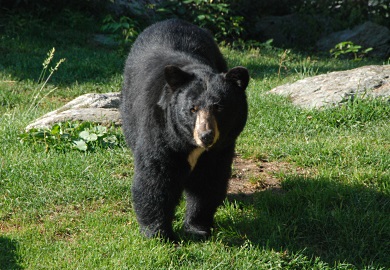April 29, 2019

SCDNR black bear biologists advise that if a bear gets into a residential bird feeder, to take the feeder down and put them away for a while, so that the bear will move on. (SCDNR photo)
Biologists with the South Carolina Department of Natural Resources (SCDNR) are reporting increased black bear activity throughout the state, and they urge people who live in these areas of bear activity to go ahead and remove their birdfeeders.
Black bear breeding season has bears on the move, and bears are hungry and looking for an easy meal. Bird feeders in people’s yards are among the favorite targets of black bears.
“If a bear has been reported in your area, go ahead and take your feeder down and leave it down,” said Tammy Wactor, SCDNR black bear biologist stationed in Clemson. “Don’t wait until the bear has knocked your feeder down to remove it. If the feeder is taken down and left down, the bear will move on.”
Dealing with bears in the Upstate is a neighborhood problem, Wactor said, and neighbors need to work together. If a neighborhood hears of a bear in the area, everyone should take their feeders down, and leave them down. If every single person with a bird feeder in the neighborhood doesn’t take that feeder down, then the black bear will find a reason to stay in the area.
The mere presence of a black bear does not necessarily represent a problem. Most bears are just passing through, but if there is an easy meal to be found, they will take advantage of it. The key to dealing with wandering bears is not giving them a reason to hang around. Removing any food source that would attract bears will greatly reduce any bear issues in residential areas.
SCDNR offers these common-sense suggestions to better cope with bears:
- Bird feed and feeders: If a bear starts getting into your bird feeders—and they will if given the chance—take the feeders down and put them away for a while; the bear will move on quickly.
- No garbage: Keep garbage in tightly shut or bear-proof trash cans; garbage left in the open, in an open dumpster, or in the back of a truck is an open invitation for a bear.
- Pet food storage: Store pet food properly if kept outside; put pet food in airtight storage containers and don't leave leftover food out in the open.
- Clean grills: Keep charcoal and gas grills covered and clean to keep food odors from attracting bears.
- Beehives: If you're going to have beehives in bear territory, protect your investment with an electric, bear-proof fence.
- No feeding: A bear that becomes accustomed to having food provided is an accident waiting to happen; don't feed a bear the first time and it will likely leave the area soon.
While people may be excited about seeing a bear, biologists urge them to remember that bears are wild animals and should be respected. Black bears are usually shy, evasive and non-aggressive toward people. Neither a human fatality nor even an attack have been attributed to a black bear in South Carolina.



